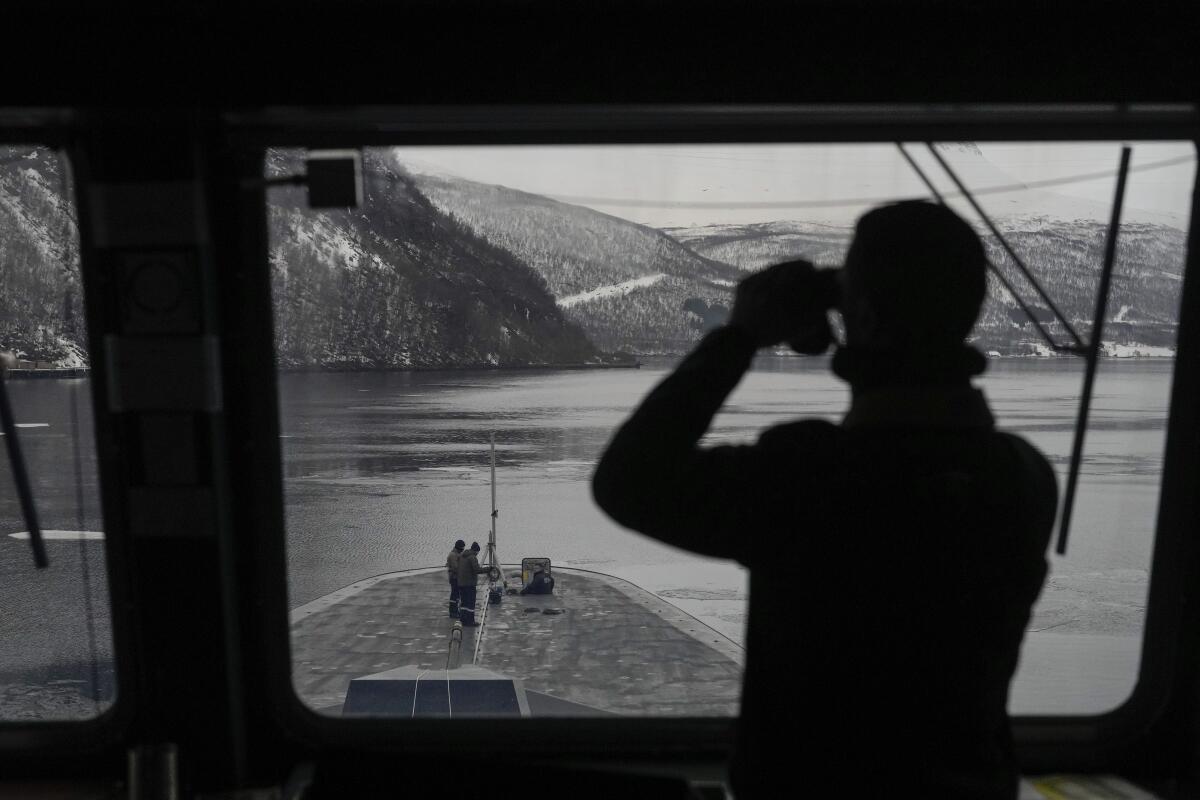Aiming for a real-life feel, NATO’s biggest drills since the Cold War send a signal to Russia

- Share via
ABOARD THE FRENCH FRIGATE NORMANDIE — Expansive NATO drills in the frigid fjords of northern Norway may be just war games meant to hone the fighting skills of the newly expanded 32-nation military alliance. But for the troops taking part, they are very real.
And that’s the whole point.
With drills underway, the North Atlantic Treaty Organization is baring its fangs in its biggest exercises since the Cold War, sending a message to Russia that alliance members are ready to defend one another if needed.
Amid Russia’s full-scale invasion of Ukraine, now in its third year, the NATO training aims to cover all eventualities. That can include trying to catch troops off guard.
This month, crew members aboard Normandie, one of France’s most modern warships, were roused from sleep and scrambled to hunt down and destroy a submarine that had sneaked into cold Norwegian waters.
The submarine belongs to Germany, also a NATO member. But for the purpose of the war games dubbed Nordic Response 2024, it was acting as an enemy vessel.
The Normandie crew spotted the periscope poking through the waves. The submarine had already “attacked” a nearby Italian ship, the aircraft carrier Giuseppe Garibaldi, scoring an imaginary torpedo hit.
The crew was determined not to let Normandie — a top-of-the-line vessel, in service since 2020 — suffer the indignity of being struck.
An urgent 7 a.m. call got Normandie’s commander, Capt. Thomas Vuong, up from his bunk. He ordered the frigate’s submarine-hunting helicopter to be readied for flight.
“We spotted its attack periscope,” Vuong told the Associated Press on board Normandie in an exclusive interview. “Then it dived again. We were asked to hunt for it. We succeeded.”
Normandie’s NH90 helicopter hovered over the waves and lowered its submarine-detecting sonarinto the sea. The frigate also used its sonar; together, they zeroed in on the sub’s position and “attacked” it in turn.
“Intelligence confirmed to us that there were no friendly submarines in the sector, so we were certain that it was an enemy submarine,” the helicopter pilot, Lt. Olivier, recounted. (The French navy withheld his last name for security reasons.) “So the frigate was able to fire a torpedo and destroy the submarine,” he added — not for real, of course.
The frigate and its helicopter pinpointed the submarine with sufficient accuracy to ensure it wouldn’t have survived had actual torpedoes been fired.
The Normandie crew of 146 mariners got no advance warning of the German sub “attack,” to test their readiness in the inhospitable environment above the Arctic Circle, Vuong said.
As of this month, NATO nations include Sweden, which formally joined Thursday as the 32nd member, ending decades of post-World War II neutrality. Finland joined NATO in April 2023 in a historic move after decades of military nonalignment. Russia’s aggression in Ukraine triggered a dramatic shift in public opinion in both countries, leading to their May 2022 applications to join the transatlantic alliance.
The drill in the northern regions of Finland, Norway and Sweden kicked off March 4 and involves more than 20,000 troops from 13 nations.
It is part of wider exercises known as Steadfast Defender 24, NATO’s biggest in decades, with up to 90,000 troops involved over several months. The exercises are aimed at showing that the alliance can defend all of its territory, up to its borders with Russia.
German submariners are more familiar than Normandie with Norway’s deep, narrow fjords, and the cold Arctic waters can complicate submarine detection, Vuong said.
The drill was “extremely beneficial, because we reach a very high degree of realism, and so we better prepare our teams,” he said. “The fjords are a special environment, with a temperature profile different to what we know in the Atlantic.
“To be able to train our teams here, against this threat, is extremely valuable and extremely stimulating,” he added. “This is their playing field. So they know the hiding places.”
More to Read
Sign up for Essential California
The most important California stories and recommendations in your inbox every morning.
You may occasionally receive promotional content from the Los Angeles Times.













